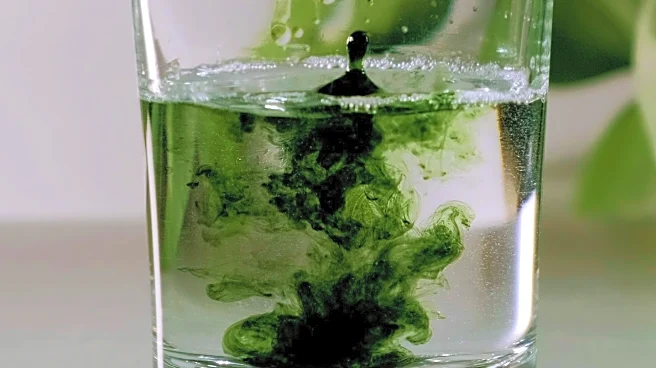What's Happening?
During a medical roundtable in September 2025, biophysicist Andreas Kalcker presented his research on chlorine dioxide (ClO₂) as an 'electromolecular regulator' of disease. Kalcker, who has studied the
compound for over two decades, proposes using ClO₂ to address energetic failures underlying diseases. He argues that illness is not merely due to pathogen overgrowth but is linked to an 'energetic low-voltage terrain' where oxidative therapies can restore order. Kalcker emphasizes that chlorine dioxide is not a cure-all but has potential applications in infections, chronic inflammation, and oncology when applied correctly. He highlights the importance of precise preparation and medical supervision in its use.
Why It's Important?
Kalcker's approach to using chlorine dioxide as an electromolecular agent could have significant implications for medical treatments. By reframing oxidation as an electrical process, he suggests that ClO₂ can target pathogens without damaging healthy cells, potentially offering a new avenue for treating infections and inflammatory conditions. This method could impact how diseases are managed, particularly in areas where traditional pharmacological treatments are less effective. However, the use of chlorine dioxide in medicine remains controversial, with regulatory bodies like the FDA warning against unapproved medical use. The broader acceptance of this approach would require rigorous scientific validation and regulatory approval.
What's Next?
Kalcker calls for formal research and medical training to explore electromolecular medicine systematically. The future of chlorine dioxide as a medical treatment depends on clinical trials and toxicological transparency. While some niche suppliers and clinics offer CDS protocols, major pharmaceutical companies have yet to market chlorine dioxide as a medical product. The debate over its use straddles frontier biophysics and regulatory caution, and its acceptance in mainstream medicine will hinge on further evidence and regulatory endorsement.
Beyond the Headlines
Kalcker's advocacy for chlorine dioxide highlights the potential for energy-based therapeutics in medicine. His approach challenges traditional pharmacological methods by focusing on bioelectrical communication and cellular energy. This perspective could lead to a paradigm shift in how diseases are understood and treated, emphasizing the role of energy and redox balance in health. The ethical and scientific challenges of integrating such therapies into mainstream medicine remain significant, requiring careful consideration and robust evidence.









